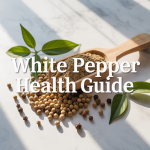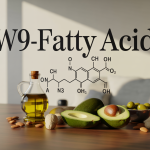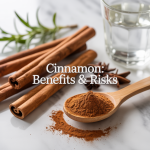Your diet plays a crucial role in keeping your heart strong and reducing your risk of cardiovascular disease. This guide is designed for anyone who wants to make heart-smart food choices – from people with existing heart conditions to those simply looking to prevent future problems through better nutrition.
The best foods for a strong and healthy heart include nutrient-packed options that actively work to protect your cardiovascular system. We’ll explore protein powerhouses like salmon and beans that deliver omega-3s and fiber to support heart function. You’ll also discover heart-smart whole grains and fiber sources such as oats and barley that help manage cholesterol levels. Finally, we’ll cover nutrient-dense fruits and vegetables that provide antioxidants and essential minerals to keep your arteries healthy and blood pressure in check.
Making these simple dietary changes can have a powerful impact on your heart health, and the best part is that these foods are delicious and easy to incorporate into your daily meals.
Protein Powerhouses for Heart Protection
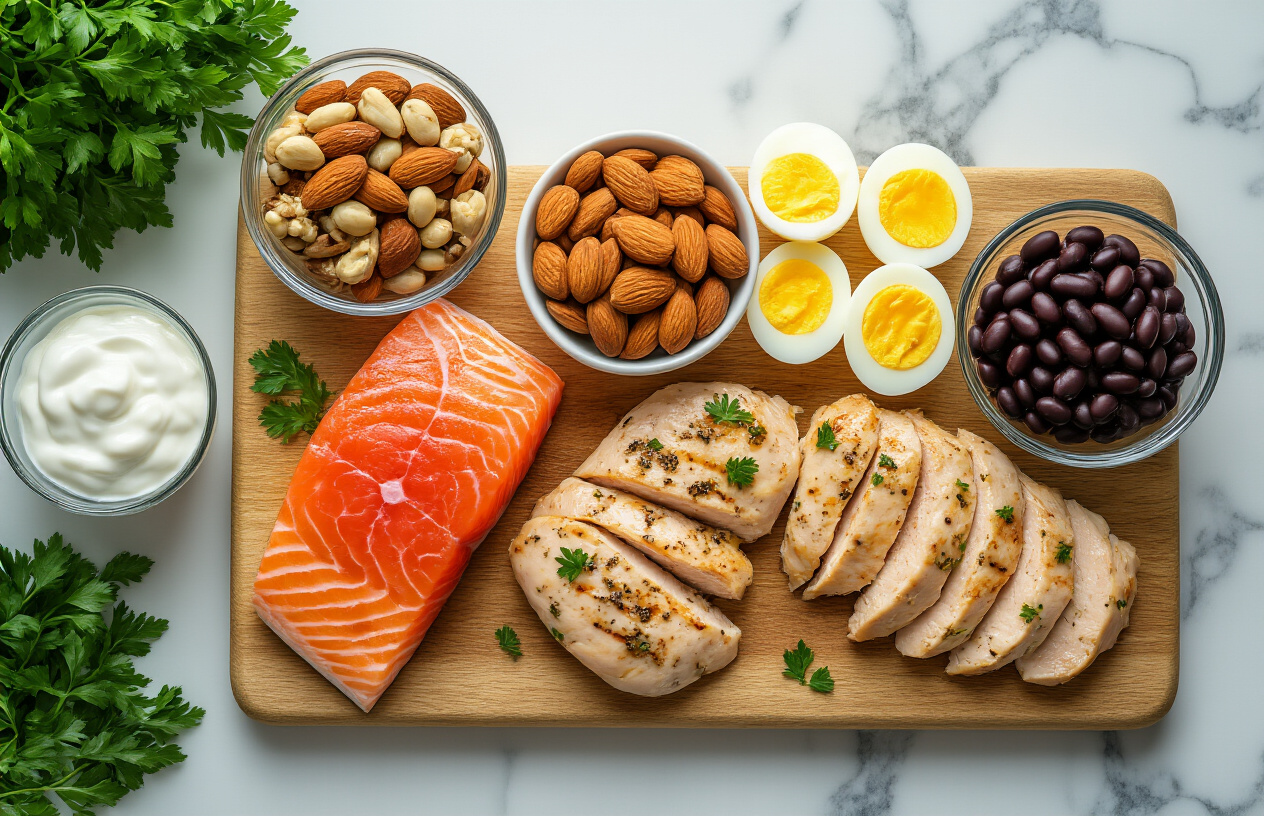
Fatty Fish Rich in Omega-3s for Cardiovascular Health
Salmon stands out as one of the most powerful heart-protective proteins available, delivering substantial amounts of omega-3 fatty acids that provide comprehensive cardiovascular benefits. These essential fats work systematically to reduce the risk of dangerous heart rhythm disorders while simultaneously lowering blood pressure and reducing triglyceride levels. The anti-inflammatory properties of omega-3s in salmon help protect arterial walls from damage and reduce overall cardiovascular inflammation.
The American Heart Association specifically recommends consuming two servings per week of salmon or other omega-3 rich oily fish, including mackerel, herring, lake trout, sardines, and anchovies. To maximize the heart benefits while maintaining optimal flavor, baking salmon in foil with fresh herbs and vegetables creates a nutrient-dense meal. Additionally, incorporating leftover salmon into fish tacos and salads provides versatile ways to meet weekly omega-3 requirements.
Tuna offers another excellent source of heart-protective omega-3s, with Albacore (white tuna) containing higher concentrations than other varieties. When selecting canned tuna, choosing water-packed options over oil-packed versions helps avoid unnecessary added fats while preserving the natural omega-3 content that supports cardiovascular health.
Plant-Based Proteins That Lower Cholesterol Naturally
Black beans emerge as exceptional plant-based protein sources, delivering a concentrated blend of heart-healthy nutrients including folate, powerful antioxidants, and magnesium. The magnesium content in black beans plays a crucial role in naturally lowering blood pressure, while their impressive fiber content works dual functions by helping control both cholesterol levels and blood sugar stability. When using canned black beans, rinsing them thoroughly removes excess sodium, making them even more heart-friendly.
Edamame, or soybeans, provides high-quality soy protein that has been scientifically shown to help lower cholesterol levels naturally. Beyond protein benefits, a single cup of edamame delivers an impressive 8 grams of heart-healthy fiber. For optimal preparation, boiling frozen edamame and serving them warm in the pod creates a satisfying, nutrient-dense snack that supports cardiovascular health.
Lean Alternatives to Traditional High-Fat Proteins
Tofu represents an outstanding vegetarian protein alternative that delivers heart-healthy benefits through its unique combination of soy protein, essential minerals, fiber, and beneficial polyunsaturated fats. Its remarkable ability to absorb flavors from spices and sauces makes it incredibly versatile for heart-healthy meal preparation. For maximum cardiovascular benefits, firm tofu can be chopped, marinated, then grilled or stir-fried using minimal oil. Alternatively, adding tofu to soups provides substantial protein content with minimal added fat, creating satisfying meals that support heart health.
Heart-Smart Whole Grains and Fiber Sources

Cholesterol-Fighting Grains for Better Blood Sugar Control
Barley stands out as an exceptional cholesterol-fighting grain that delivers dual benefits for heart health and blood sugar management. This nutty whole grain contains powerful fiber compounds that actively work to reduce both cholesterol levels and blood sugar spikes. When selecting barley, opt for hulled or “whole grain” varieties, as these retain the most nutritional value and provide maximum heart-protective benefits.
Oatmeal serves as another cornerstone grain for cardiovascular wellness, particularly excelling at maintaining stable blood sugar levels. This makes it an invaluable food choice for individuals managing diabetes while supporting overall heart health. The soluble fiber in oatmeal specifically targets bad cholesterol (LDL), helping to sweep it from the bloodstream and reduce cardiovascular risk. For optimal results, choose steel cut or slow cooked oats over instant varieties, as these maintain more of their natural fiber structure and provide sustained energy release.
High-Fiber Options That Support Heart Function
The fiber content in these heart-smart grains works through multiple mechanisms to support cardiovascular function. Barley’s fiber creates a gel-like substance in the digestive tract that binds to cholesterol and prevents its absorption, effectively lowering overall cholesterol levels while simultaneously slowing glucose absorption for better blood sugar control.
Oatmeal’s fiber operates similarly, forming a protective barrier that helps regulate both cholesterol and blood sugar levels. This dual action makes these grains particularly valuable for individuals seeking comprehensive heart protection through dietary choices.
Ancient Grains That Boost Cardiovascular Wellness
Flaxseed represents a powerful ancient superfood that combines multiple heart-protective compounds in one small package. This remarkable seed contains three distinct cardiovascular benefits: high fiber content, phytochemicals called lignans, and omega-3 fatty acids. Together, these compounds create a synergistic effect that supports optimal heart function and reduces inflammation throughout the cardiovascular system.
To maximize flaxseed’s nutritional benefits, always grind the seeds before consumption, as whole flaxseeds often pass through the digestive system undigested. Ground flaxseed can be seamlessly incorporated into daily meals by adding it to cereal, baked goods, yogurt, or even spreading it on sandwiches mixed with mustard for an extra nutritional boost.
Creative incorporation tip: Replace one-third of the flour in baked goods with oats to increase fiber content while maintaining texture and adding subtle nutty flavor to your favorite recipes.
Nutrient-Dense Fruits for Artery Protection
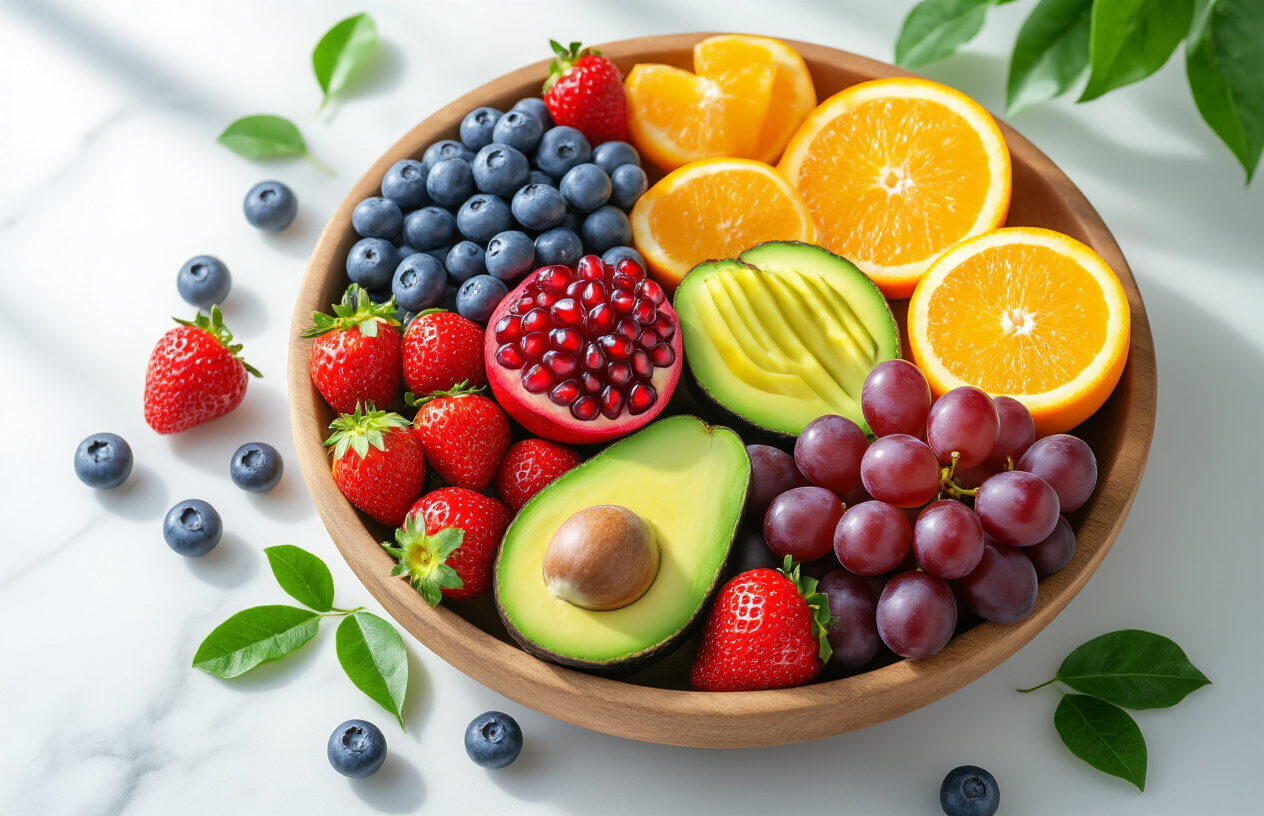
Antioxidant-Rich Berries That Strengthen Blood Vessels
Cherries stand out as exceptional cardiovascular protectors, packed with powerful antioxidants called anthocyanins that are believed to help protect blood vessels from damage. Whether you choose sweet cherries, sour varieties, dried forms, or cherry juice, you’re getting concentrated doses of these vessel-strengthening compounds. To incorporate more cherries into your heart-healthy diet, try sprinkling dried cherries into your morning cereal, mixing them into muffin batter for a nutritious treat, adding them to green salads for a sweet contrast, or stirring them into wild rice dishes for enhanced flavor and nutrition.
Blueberries deserve equal recognition for their cardiovascular benefits, containing the same blood vessel-helping anthocyanins that give these berries their distinctive dark blue color. Beyond their antioxidant power, blueberries provide valuable fiber and other essential nutrients that support overall heart health. These versatile berries can easily enhance your daily meals – add fresh or dried blueberries to breakfast cereal, fold them into pancake batter, or mix them into yogurt for a nutritious snack. For a heart-healthy dessert option, consider pureeing blueberries to create a naturally sweet sauce that can replace processed toppings.
Citrus Fruits That Control Blood Pressure Naturally
Sweet and juicy oranges emerge as natural blood pressure controllers, containing cholesterol-fighting fiber called pectin alongside potassium, a crucial mineral for cardiovascular regulation. Research demonstrates the impressive blood pressure benefits of oranges – one study revealed that consuming 2 cups of orange juice daily successfully lowered diastolic blood pressure among patients with overweight conditions. This makes oranges particularly valuable for individuals seeking natural approaches to blood pressure management.
The nutritional profile of oranges makes them an excellent choice for heart-conscious individuals. A medium orange contains approximately 62 calories and provides 3 grams of beneficial fiber, making it a low-calorie, high-nutrition option that supports both weight management and cardiovascular health.
Potassium-Rich Fruits for Heart Rhythm Support
Previously mentioned oranges also serve as excellent sources of potassium, the essential mineral that plays a critical role in maintaining healthy heart rhythm and controlling blood pressure. This dual benefit makes citrus fruits particularly valuable for comprehensive cardiovascular support, providing both immediate blood pressure benefits and long-term heart rhythm stability through their potassium content.
Vegetables That Promote Optimal Heart Health

Dark Leafy Greens for Blood Vessel Function
Dark leafy greens stand as nutritional powerhouses that directly support optimal blood vessel function and cardiovascular health. These vibrant vegetables, including lettuce, spinach, bok choy, mustard greens, and arugula, are packed with essential vitamins and minerals that work synergistically to promote heart wellness.
The exceptional heart-protective benefits of dark leafy greens stem primarily from their high nitrate content. These naturally occurring compounds play a crucial role in opening blood vessels, ensuring that oxygen-rich blood can efficiently reach your heart muscle. This enhanced circulation reduces the workload on your cardiovascular system and supports overall heart function.
Swiss chard deserves special recognition among dark leafy greens for its impressive mineral profile. Rich in both potassium and magnesium, Swiss chard helps regulate blood pressure naturally while providing heart-healthy fiber, vitamin A, and powerful antioxidants including lutein and zeaxanthin. These compounds work together to protect your cardiovascular system from oxidative stress and inflammation.
To maximize the heart benefits of dark leafy greens, consider versatile preparation methods. You can add these nutrient-dense vegetables to stir-fries for a quick and flavorful meal, sauté them with olive oil to enhance nutrient absorption, or roast them with garlic for added flavor complexity. For Swiss chard specifically, try sautéing with olive oil and garlic until wilted, then season with fresh herbs and pepper to create a delicious and heart-healthy side dish.
Colorful Vegetables Rich in Heart-Protective Compounds
Now that we’ve explored the blood vessel benefits of dark leafy greens, let’s examine how colorful vegetables provide additional heart-protective compounds that support cardiovascular wellness through their unique nutritional profiles.
Sweet potatoes represent an excellent example of how colorful vegetables can promote heart health through multiple mechanisms. Unlike their white counterparts, sweet potatoes have a lower glycemic index, which prevents rapid spikes in blood sugar levels that can stress the cardiovascular system over time. This steady blood sugar response helps maintain consistent energy levels while reducing strain on your heart.
Beyond their glycemic advantages, sweet potatoes contain a powerful combination of heart-protective nutrients. They provide substantial amounts of fiber, which helps maintain healthy cholesterol levels and supports overall cardiovascular function. The high vitamin A content in sweet potatoes acts as an antioxidant, protecting heart tissues from cellular damage, while lycopene offers additional antioxidant protection specifically beneficial for cardiovascular health.
Mineral-Rich Vegetables That Regulate Blood Pressure
Previously, we’ve discussed how various vegetables support heart health through different mechanisms. With this in mind, mineral-rich vegetables deserve special attention for their direct impact on blood pressure regulation, a critical component of cardiovascular wellness.
Swiss chard exemplifies how mineral-rich vegetables can naturally support healthy blood pressure levels. Its exceptional potassium and magnesium content works in harmony to help control blood pressure through multiple pathways. Potassium helps counteract the effects of sodium in your diet, while magnesium supports proper muscle function in blood vessel walls, allowing for better blood flow regulation.
To enhance the natural benefits of mineral-rich vegetables like sweet potatoes, focus on preparation methods that preserve their nutritional value while adding complementary flavors. Instead of using sugary toppings that can counteract heart benefits, boost sweet potatoes’ natural sweetness with a sprinkle of cinnamon and a squeeze of fresh lime juice, creating a delicious and heart-healthy preparation that supports your cardiovascular goals.
Healthy Fats and Oils for Cholesterol Management
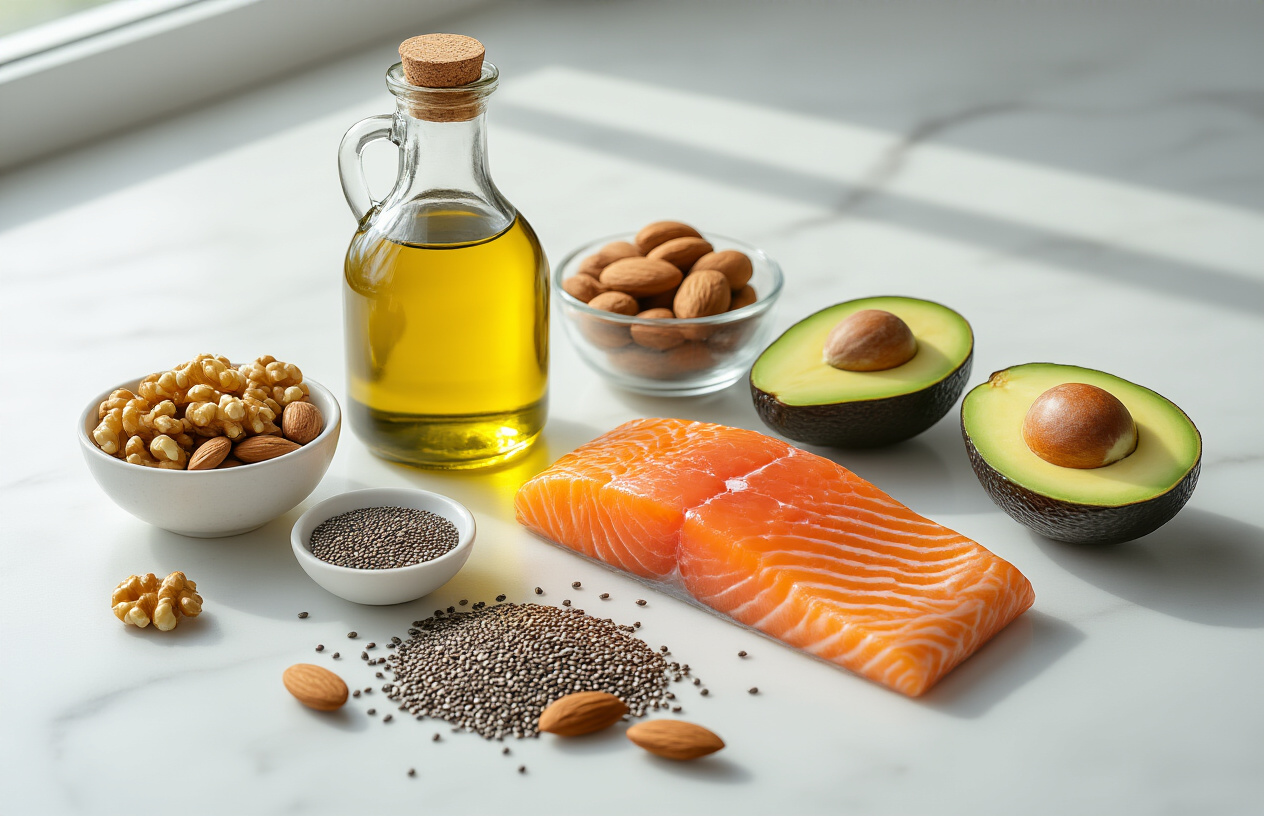
Monounsaturated Fats That Replace Harmful Saturated Fats
Olive oil stands as one of the most powerful monounsaturated fats for heart protection, offering a rich source of heart-healthy antioxidants that actively protect your blood vessels. When you strategically replace saturated fats like butter with olive oil in your cooking and food preparation, you can effectively help lower your cholesterol levels. This simple substitution makes a significant impact on your cardiovascular health by reducing the harmful fats that contribute to arterial damage and cholesterol buildup.
For optimal heart benefits and flavor, selecting cold-pressed olive oil ensures you’re getting the highest quality product with maximum nutritional value. To maintain its protective properties and taste, use your olive oil within six months of opening, as the beneficial compounds can degrade over time when exposed to light and air.
Omega-3 Rich Nuts and Seeds for Heart Protection
Walnuts emerge as exceptional heart-protective nuts, with research showing that consuming just a small handful daily may effectively lower your cholesterol levels while protecting against inflammation in your heart’s arteries. These nutrient-dense nuts pack an impressive combination of omega-3 fatty acids, healthy monounsaturated fats, plant sterols, and fiber – all working synergistically to support cardiovascular function.
The key to maximizing walnut benefits lies in using them as a replacement for harmful fats in your diet rather than simply adding them on top of your existing food intake. For culinary variety, consider incorporating walnut oil into your salad dressings, which provides the same heart-protective compounds in a versatile liquid form.
Almonds offer another powerful option for cholesterol management, containing beneficial plant sterols, fiber, and heart-healthy fats that specifically target “bad” LDL cholesterol reduction. A small handful consumed daily provides optimal benefits without excessive calories. To enhance their naturally creamy, mild flavor while maintaining their nutritional value, try lightly toasting almonds before eating or adding them to dishes.
Plant-Based Oils That Support Cardiovascular Function
Now that we’ve covered the direct benefits of olive oil as a monounsaturated fat replacement, it’s important to understand how plant-based oils function as comprehensive cardiovascular support systems. Walnut oil represents an excellent plant-based alternative that delivers concentrated omega-3 benefits in a convenient liquid form, making it particularly valuable for salad dressings and light cooking applications where you want to preserve the delicate fatty acid profile.
The effectiveness of these plant-based oils comes from their ability to provide essential fatty acids and antioxidants that your body cannot produce on its own, while simultaneously replacing more harmful cooking fats that contribute to cardiovascular disease.
Dairy and Fortified Foods for Blood Pressure Control

Low-Fat Dairy Options High in Calcium and Potassium
Low-fat yogurt stands out as an exceptional choice for cardiovascular health, offering a powerful combination of calcium and potassium that works synergistically to help control high blood pressure. These essential minerals play crucial roles in maintaining optimal heart function and vascular health. When selecting yogurt for heart health benefits, it’s important to choose low-fat varieties specifically, as this approach allows you to maximize your calcium intake while minimizing saturated fat consumption that could potentially counteract the cardiovascular benefits.
The calcium content in low-fat yogurt supports proper muscle function, including the heart muscle itself, while potassium helps regulate fluid balance and supports healthy blood vessel function. Together, these nutrients create an effective natural approach to blood pressure management. The low-fat formulation is particularly important because it ensures you’re getting the maximum nutritional benefit without the added burden of excess saturated fats that can contribute to cardiovascular problems.
Fortified Foods That Block Cholesterol Absorption
Now that we have covered dairy options, it’s important to understand how certain fortified foods can actively work to improve your cholesterol profile. Some margarines, soy milks, almond milks, and orange juices are strategically fortified with plant sterols and stanols, which are powerful cholesterol-fighting compounds extracted from plants.
These plant extracts work through a fascinating mechanism: they effectively block your digestive system from absorbing cholesterol, creating a natural barrier in your gut. This blocking action can lead to significant improvements in your cholesterol levels, with studies showing that these fortified foods can lower LDL (bad) cholesterol levels by up to 10% without negatively affecting your good cholesterol levels. This selective action makes fortified foods an excellent addition to a heart-healthy diet, as they provide targeted benefits without compromising the beneficial aspects of your cholesterol profile.
Heart-Healthy Alternatives to Traditional Dairy Products
With this understanding of fortified options in mind, it’s clear that plant-based alternatives offer compelling benefits for heart health. Soy milk and almond milk, particularly when fortified with sterols and stanols, provide excellent alternatives to traditional dairy products while delivering specific cardiovascular benefits. These alternatives not only offer the cholesterol-blocking properties mentioned above but also typically contain less saturated fat than their traditional dairy counterparts.
The versatility of these fortified alternatives makes them easy to incorporate into daily nutrition routines, whether used in cereals, smoothies, or consumed on their own. Similarly, fortified orange juice can serve as both a nutritious beverage choice and a vehicle for delivering these beneficial plant compounds, making it easier to achieve the consistent intake needed to see meaningful improvements in cholesterol levels.
Natural Flavor Enhancers That Replace Heart-Damaging Ingredients

Fresh Herbs and Spices Instead of Excess Salt
Fresh herbs provide an exceptional solution for those looking to reduce their sodium intake without sacrificing flavor. These aromatic additions deliver robust taste profiles that can completely transform your meals while supporting cardiovascular health. Unlike processed seasonings that often contain hidden sodium, fresh herbs offer pure flavor enhancement that works synergistically with your heart-healthy eating goals.
Spices represent another powerful category of flavor enhancers that can revolutionize your approach to heart-smart cooking. These natural ingredients provide complex taste dimensions that make reducing salt not only manageable but genuinely enjoyable. By incorporating various spices into your cooking routine, you create satisfying meals that support your cardiovascular system without relying on heart-damaging excess sodium.
Natural Seasonings That Add Antioxidants
Beyond their flavor-enhancing properties, many natural seasonings deliver valuable antioxidants that provide additional cardiovascular protection. These compounds work to combat oxidative stress and inflammation, two key factors that can negatively impact heart health. When you choose natural seasonings over processed alternatives, you’re not just avoiding harmful additives – you’re actively incorporating protective nutrients into every meal.
The antioxidant properties of various herbs and spices create a dual benefit: enhanced flavor paired with cardiovascular support. This combination makes natural seasonings an intelligent choice for anyone committed to maintaining optimal heart health through dietary choices.
Heart-Smart Cooking Methods and Preparation Tips
With this foundation of natural flavor enhancement in mind, implementing specific preparation techniques can maximize both taste and nutritional benefits. Rinsing canned beans removes extra salt while preserving their heart-protective fiber and protein content. When preparing salmon, baking it in foil with herbs creates a moisture-sealed environment that intensifies flavors without added fats.
Choosing tuna packed in water rather than oil reduces unnecessary calories while maintaining protein quality. Using olive oil on salads and cooked vegetables provides heart-healthy monounsaturated fats that support optimal cholesterol levels. Toasting almonds enhances their natural nutty flavor, making them more satisfying as heart-healthy snacks.
Boiling edamame preserves its protein content and natural taste, while grilling or stir-frying tofu with minimal oil creates satisfying plant-based meals. Boosting sweet potato sweetness with cinnamon and lime juice eliminates the need for added sugars while providing antioxidants. Sautéing Swiss chard with olive oil and garlic combines heart-healthy fats with flavor-enhancing aromatics.
Grinding flaxseed just before use ensures maximum nutritional benefit from its omega-3 fatty acids. Adding dark leafy greens to stir-fries or roasting them with garlic creates nutrient-dense dishes that support cardiovascular health through multiple pathways.
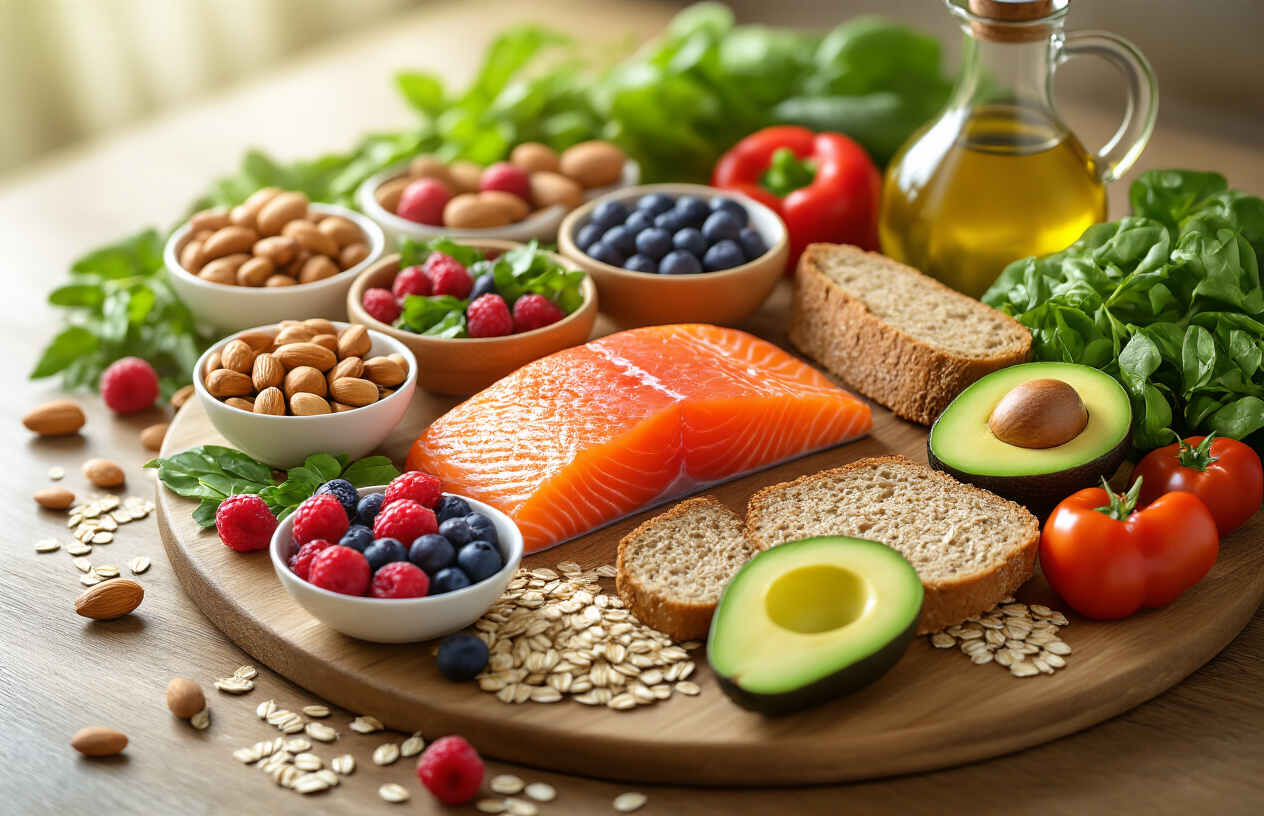
Building a heart-healthy diet doesn’t have to be complicated. By incorporating protein-rich foods like salmon and beans, fiber-packed whole grains such as oats and barley, and nutrient-dense fruits and vegetables into your daily meals, you’re taking powerful steps toward cardiovascular wellness. From the omega-3s in walnuts and tuna to the antioxidants in blueberries and cherries, each food group offers unique benefits that work together to lower cholesterol, manage blood pressure, and reduce inflammation.
The beauty of heart-healthy eating lies in its simplicity and variety. Replace salt with fresh herbs, choose olive oil over butter, and swap refined grains for whole grain alternatives. Small changes like adding a handful of almonds to your day or choosing low-fat yogurt can make a meaningful difference over time. Remember, consistency matters more than perfection—start by incorporating a few of these heart-protecting foods into your routine and gradually build from there. Your heart will thank you for every nutritious choice you make.



